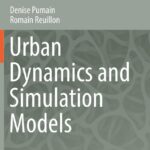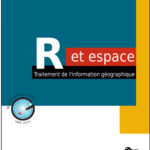Membre associé

Robin CURA
Statut / Poste
Maître de conférences en géomatique et géographie humaine, UMR PRODIG, membre associé de l’UMR Géographie-cités.
Institution
Université Paris 1 Panthéon-Sorbonne
Équipe
PARIS
Thèmes de recherches
Géovisualisation ; Données spatio-temporelles ; Analyse exploratoire interactive ; Simulation à base d’agents ; Accompagnement à la modélisation ; Outils d’analyse de simulations ; Géomatique ; S.I.G ; Cartographie
Transversalités 2019-2023
Données et protocoles dans les humanités numériques
Addresse
UMR PRODIG • Campus Condorcet • Bâtiment Recherche Sud
5 cours des Humanités – 93322 Aubervilliers cedex
Robin Cura est maître de conférences en géomatique et géographie humaine à l ‘Université Paris 1 Panthéon-Sorbonne, et membre de l’UMR PRODIG.
Il a soutenu une thèse dans l’UMR Géographie-cités en Mars 2020, sous la direction conjointe de Lena Sanders et Anne Ruas, via un contrat doctoral du LabEx DynamiTe exercé au sein de l’Université Paris 1 Panthéon-Sorbonne – Panthéon Sorbonne. Il a aussi réalisé un post-doctorat (2020-2022) à l’UMR Géographie-cités, au sein du projet ANR RECORDS où il travaille sur la géovisualisation de traces numériques individuelles, au moyen d’analyses quantitatives et visuelles de données d’écoute musicales en streaming.
Géomaticien de formation, il s’est spécialisé dans la modélisation orientée agents de phénomènes spatio-temporels, ainsi que dans l’analyse des sorties de ces modèles.
Ses recherches de thèse portent sur l’exploration et l’analyse de données spatio-temporelles, appliquées à la modélisation des transformations dans les systèmes de peuplement sur le temps long.
Formation
2020 Doctorat en géographie – Université Paris 1 Panthéon-Sorbonne / UMR Géographie-cités, « Modéliser des systèmes de peuplement en interdisciplinarité. Co-construction et exploration visuelle d’un modèle de simulation », sous la co-direction de Lena Sanders et Anne Ruas.
2011 Master 2 CarthaGéo Pro, Parcours Thématique – Université Paris 1 Panthéon-Sorbonne et ENSG, Mémoire de fin d’études « Conception de modèles et d’outils de géosimulation », sous la co-direction de Thomas Louail, Sébastien Rey-Courehourcq et Clara Schmitt.
2010 Master 1 de Géographie, Parcours CarthaGéo – Université Paris 1 Panthéon-Sorbonne , Mémoire de recherche « Ségrégation spatiale et origines ethniques dans les métropoles canadiennes », sous la co-direction de Renaud Le Goix et Antonine Ribardière.
2008 Licence de Géographie, Parcours Analyse Territoriale – Université Paris 1 Panthéon-Sorbonne .
Thèse
Titre
« Modéliser des systèmes de peuplement en interdisciplinarité. Co-construction et exploration visuelle d’un modèle de simulation ».
Résumé
Cette thèse vise à expérimenter une démarche collective et interdisciplinaire d’analyse de dynamiques spatiales sur le temps long, en se fondant sur la co-construction et l’exploration visuelle d’un modèle de simulation des transitions des systèmes de peuplements. Il s’agit de simuler les transformations du système de peuplement Nord-Ouest européen entre 800 et 1100, période de transition d’un système majoritairement dispersé à un système hiérarchisé et polarisé. L’objectif est de modéliser et d’analyser les interactions à différentes échelles qui ont provoqué ces transformations et engendré les dynamiques de polarisation, de hiérarchisation et de fixation de l’habitat.
Pour répondre à cet objectif, la thèse déploie une démarche méthodologique de co-construction d’un modèle de simulation avec des modélisateurs et des experts thématiciens archéologues, historiens et géographes. Cette démarche permet d’accompagner les thématiciens dans la modélisation conceptuelle et informatique du système étudié, via le développement du modèle à base d’agents SimFeodal. Le modèle est collectivement évalué, paramétré et exploré grâce à la mise en oeuvre d’une méthode d’évaluation visuelle. On peut alors tester les hypothèses sous-jacentes aux processus mobilisés pour décrire les dynamiques spatiales modélisées en comparant systématiquement les sorties du modèle. La comparaison est rendue possible par l’utilisation d’un environnement d’exploration, la plateforme SimEDB. Cet outil interactif conçu spécifiquement pour cet usage permet l’exploration des données spatio-temporelles massives issues du modèle, et facilite ainsi l’analyse collective et interdisciplinaire des hypothèses thématiques.
Mots-clés
Modélisation à base d’agents; visualisation; systèmes de peuplement; temps long; interdisciplinarité; SimFeodal; SimEDB.
Activités professionnelles
2022 – … Maître de conférences en géomatique et géographie humaine, Université Paris 1 Panthéon-Sorbonne, UMR PRODIG
2020 – 2021 Post-doctorant en géovisualisation de traces numériques individuelles, ANR RECORDS (dir. Thomas Louail), CNRS, UMR 8504 Géographie-cités
2016 – 2017 Attaché Temporaire d’Enseignement et de Recherche (ATER), Université Paris 1 Panthéon-Sorbonne , UFR de Géographie
2013 – 2016 Doctorant Contractuel avec Mission d’Enseignement, Contrat Doctoral du LabEx DynamiTe, Université Paris 1 Panthéon-Sorbonne , UFR de Géographie
2012 – 2013 Ingénieur d’étude en traitement et analyse de bases de données géographiques, ANR TransMonDyn (dir. Lena Sanders), CNRS, UMR 8504 Géographie-cités
2012 Ingénieur d’étude en calcul scientifique, ANR MIRO² (dir. Arnaud Banos), Institut des Systèmes Complexes de Paris Île-de-France
2011 – 2012 Ingénieur d’étude en traitement et analyse de bases de données géographiques, ERC GeoDiverCity (dir. Denise Pumain), CNRS, UMR 8504 Géographie-cités
Activités scientifiques
Projets de recherche
2022 – 2025 Membre du projet MAMA-Culture, porté par Thomas Louail et Philippe Coulangeon
2020 – 2024 Membre du projet ANR RECORDS, porté par Thomas Louail.
2012 – 2016 Membre du projet ANR TransMonDyn, porté par Lena Sanders.
2011 – 2016 Membre du projet ERC GeoDiverCity, porté par Denise Pumain.
Groupes de travail
2022 – … Co-animateur du groupe ElementR.
2022 – 2027 Co-porteur (avec Françoise Bahoken, Anne-Christine Bronner, Etienne Côme, Nicolas Lambert et Boris Mericskay) de l’Action de Recherche (9) « (Carto)graphies et (Géo)visualisations de données » du GDR MAGIS.
2017 – 2021 Co-porteur (avec Paule-Annick Davoine et Hélène Mathian) de l’A.P. GeoVisAnalytics , puis A.P. GéoVisualisation (idem, plus Sidonie Christophe et Marlène Villanova-Oliver) du GDR MAGIS.
2015 – 2021 Membre du GDR MAGIS – A.P. Ontologie et Dynamiques Spatiale.
2013 – 2020 Membre du groupe de travail « Système de Peuplement » du LabEx DynamiTe.
2012 – 2017 Membre du groupe ElementR.
Formations
2023 Formation « Analyses critiques en pratique autour des données spatiales massives « collatérales » », École Thématique CritiGIS, Pic Saint-Loup.
2018 Formation « Géovisualisation avec R » (avec H. Mathian et L. Vaudor), École Thématique GéoViz, Aussois.
2018 Co-organisation (avec S. Christophe, P.-A. Davoine, H. Mathian et M. Villanova-Oliver) de l’École Thématique GéoViz du GDR MAGIS.
2016 Formation « Systèmes Multi-Agents » (avec O. Plattard), École d’été du LabEx DynamiTe, Catane (Sicile, Italie).
2015 Formation « Créer des documents reproductibles et des applications web interactives d’analyse de données avec R: Knitr & Shiny », EVS-ISIG: Café méthodo, ENS de Lyon.
2014 Stage de formation (avec Hadrien Commenges) : « Statistique et analyse spatiale avec R », Maison des Sciences de l’Homme de Dijon, Dijon.
Enseignement
Publications
Communications
Bourses et distinctions
2021 Prix de Thèse 2020 du GDR MAGIS.
2016 Premier Prix du concours Géovisualisation et Cartographies Dynamiques du F.I.G. de Saint-Dié-des-Vosges


 CURA R. (2021), « Pour une évaluation visuelle des modèles de simulation, au-delà de la face validation. », in. Actes de la conférence SAGEO 2021, Actes Avignon, May 2021, La Rochelle, France. ISBN : 978-2-910545-12-1.
CURA R. (2021), « Pour une évaluation visuelle des modèles de simulation, au-delà de la face validation. », in. Actes de la conférence SAGEO 2021, Actes Avignon, May 2021, La Rochelle, France. ISBN : 978-2-910545-12-1.  OZOUF-MARIGNIER M.-V., FILET C., CURA R. (2020), « Territoire, réseau », in. SANDERS L., BRETAGNOLLE A., BRUN P., OZOUF-MARIGNIER M.-V., VERDIER N. (dir), Le temps long du peuplement : concepts et mots-clés, pp. 233-284, Presses Universitaires François Rabelais, Tours. ISBN :
OZOUF-MARIGNIER M.-V., FILET C., CURA R. (2020), « Territoire, réseau », in. SANDERS L., BRETAGNOLLE A., BRUN P., OZOUF-MARIGNIER M.-V., VERDIER N. (dir), Le temps long du peuplement : concepts et mots-clés, pp. 233-284, Presses Universitaires François Rabelais, Tours. ISBN :  CURA R. (2020), « Visualiser les modèles », in. PUMAIN D. (dir), La modélisation en géographie : villes et territoires, pp. 157-198, John Wiley & Sons Ltd. ISBN :
CURA R. (2020), « Visualiser les modèles », in. PUMAIN D. (dir), La modélisation en géographie : villes et territoires, pp. 157-198, John Wiley & Sons Ltd. ISBN :  CURA R., TANNIER C., LETURCQ S., ZADORA-RIO E., LORANS E., RODIER X. (2017), « Transition 8 – 800-1100 : Fixation, polarisation et hiérarchisation de l’habitat en Europe du Nord-Ouest », in. SANDERS L. (dir), Peupler la Terre : de la préhistoire à l’ère des métropoles, pp. 301-332, Presses Universitaires François Rabelais, Tours. DOI :
CURA R., TANNIER C., LETURCQ S., ZADORA-RIO E., LORANS E., RODIER X. (2017), « Transition 8 – 800-1100 : Fixation, polarisation et hiérarchisation de l’habitat en Europe du Nord-Ouest », in. SANDERS L. (dir), Peupler la Terre : de la préhistoire à l’ère des métropoles, pp. 301-332, Presses Universitaires François Rabelais, Tours. DOI :  PUMAIN D. (dir.), REUILLON R. (dir.), CHAPRON P., CHÉREL G., COTTINEAU C., CURA R., LECLAIRE M., REY-COYREHOURCQ, S., SCHMITT C., SWERTS E. (2017), Urban Dynamics and Simulation Models, Springer International Publishing. ISBN : 978-3-319-46497-8, DOI :
PUMAIN D. (dir.), REUILLON R. (dir.), CHAPRON P., CHÉREL G., COTTINEAU C., CURA R., LECLAIRE M., REY-COYREHOURCQ, S., SCHMITT C., SWERTS E. (2017), Urban Dynamics and Simulation Models, Springer International Publishing. ISBN : 978-3-319-46497-8, DOI :  Groupe ELEMENTR, COMMENGES H. (dir) (2014), R et espace. Traitement de l’information géographique, Framabook. ISBN :
Groupe ELEMENTR, COMMENGES H. (dir) (2014), R et espace. Traitement de l’information géographique, Framabook. ISBN : 